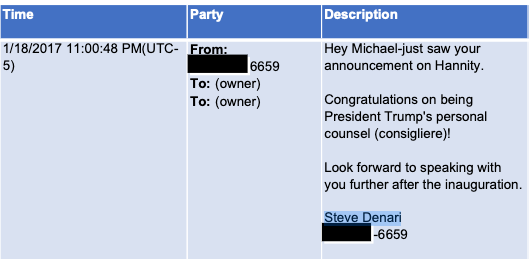Adam Klasfeld
@KlasfeldReports
·
5h
Trump et al return — with some fewer "et als."
His GOP allies have left.
We're back.
Q: Mr. Cohen, are you familiar with an attorney named Robert Costello?
A: I am.
Next exhibit: Email from Costello to Cohen, dated April 19, 2018
The email validated Costello's relationship to Giuliani and the concept of the "backchannel," Cohen said.
Next email: Costello conveys convo with Rudy to Cohen:
"He asked me to tell you that he knows how tough this is on you and your family and he will make su[r]e to tell the President. He said thank you for opening this back channel of communication and asked me to keep in touch."
On June 13, 2018, Costello told Cohen that "my friend has communicated to me that he is meeting with his client this evening and he added that if there was anything you wanted to convey you should tell me and my friend will bring it up for discussion this evening."
Cohen says he understood Costello's "friend" was Rudy Giuliani, whose "client" was then-President Trump.
For Cohen, the "covert" mode of communication had an "I-Spy-ish" feel, he says.
Email from Bob Costello, seemingly frustrated at Cohen for not retaining him:
"When I suggested that we meet and discuss a strategy following this news you suddenly took a new approach and stated: 'That's not going to happen.' Stunned by this remark, I was asking you for a clarification of our legal relationship."
Costello to Cohen 6/14/18
"It seems clear to me that you are under the impression that Trump and Giuliani are trying to discredit you and throw you under the bus to use your phrase. I think you are wrong because you are believing the narrative promoted by the left wing media."
Costello to Cohen, email (cont'd)
"You are making a very big mistake if you believe the stories these 'journalists' are writing about you. They want you to cave. They want you to fail. They do not want you to persevere and succeed."
Cohen testifies: "This is part of the pressure campaign."
Cohen says he never told Robert Costello the truth about Trump's involvement in the Stormy Daniels payoff because he didn't "trust" him — and he remained loyal to Trump at the time.
Cohen says he had conversations with his family, following the FBI's search.
At the time, Cohen says, he did not know what SDNY was even looking at — and he was in a "unique situation."
(Trump's GOP entourage reenters the courtroom during this monologue.)
Cohen delivers this line straight to the jury, in a soft and measured tone.
"I made a decision again based on a conversation with my family: I would not lie for President Trump any longer."
After two leading versions of the question prompt sustained objections, the prosecutor asks:
Q: Why in fact did you pay that money to Stormy Daniels?
A: To ensure that the story would not come out, would not affect Mr. Trump's chances of becoming President of the United States.
Cohen testifies (accurately) that, during his guilty plea on campaign finance violations, he and prosecutors said that he committed his crimes at Trump's direction and benefit.
Cohen said that his guilty plea was the "worst day of my life."
Cohen recounts his apologies to Congress and the American people at the hearing.
He says that "the citizenry had a right to know" the information withheld from the public — another line delivered directly at the jury.
Several of the jurors return Cohen's eye contact, during his narration about being fitted for an ankle bracelet.
The prosecutor gets ahead of a defense line of attack.
During his civil trial, Michael Cohen claimed that he lied by falsely pleading guilty to tax crimes associated with his tax medallions. Cohen says that he "did not dispute there was an error" in his taxes.
Cohen previously claimed that federal prosecutors unjustly pressured him to plead guilty to that, by threatening to prosecute his wife.
Today, Cohen testifies that his critique was that it was overkill by prosecutors.
Cohen says he was a "first time offender," who "consistently paid taxes on its due date," who had "never been audited."
He expressed surprise "that this would go immediately to a criminal charge."
Expect more on this during cross-examination.
Prosecutor Hoffinger asks Cohen about his civil fraud trial testimony on the topic.
Q: Did you admit under question that yes, it was a lie when you agreed to plead guilty to those counts?
A: Yes.
Cohen testifies that he "never disputed" the "underlying fact."
"I was given 48 hours to accept their plea," or a superseding indictment would name his wife, Cohen says.
"And I was going to protect my wife," he tells the jury.
Certain jurors appear to take some notes during this exchange.
Michael Cohen, on his podcast.
"I named it 'Mea Culpa' for two reasons. First it was my responsibility, which I take. Second, it was because they're my initials."
(Full disclosure: I'm somewhat embarrassed to say I never made the second connection.)
Cohen is asked about his books.
Analysis: Prosecutors have turned to the part of direct examination commonly abbreviated as "BOBS" — "Bring Out the Bad Stuff."
They defang attacks on a witness's credibility—antagonism vs the defendant, financial motives, and rap sheets—by bringing it out themselves.
Michael Cohen's closing lines:
"I regret doing things for [Trump] that I should not have. Lying. Bullying people in order to effectuate a goal. I don't regret working with the Trump Organization." (cont'd)
Cohen's closing lines (cont'd)
"As I expressed before, I had some very interesting, great times. But to keep a loyalty and to do the things that he asked me to do, I violated my moral compass, and I suffered the penalty, as has my family."
Prosecutor: "No further questions."
Cross will begin after the lunch recess.
